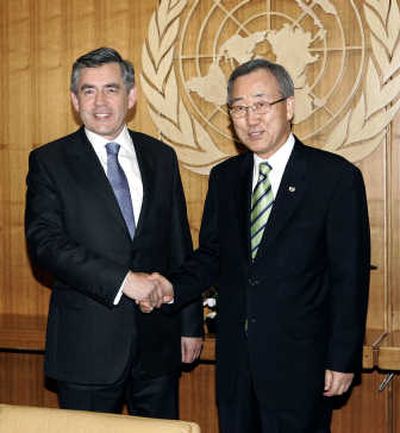U.N. offers more help for Iraq mission

UNITED NATIONS – The U.N. has offered to bolster its presence in Baghdad for the first time in more than three years, laying the groundwork for a more ambitious role in mediating the country’s sectarian disputes.
The move comes three weeks after President Bush delivered his second personal appeal to Secretary-General Ban Ki-moon to help resolve some of Iraq’s intractable religious and ethnic conflicts. The top U.N. political adviser, B. Lynn Pascoe, told the Security Council on Tuesday that the U.N. would be prepared to increase the size of its mission in Baghdad by nearly 50 percent, raising the ceiling from 65 to as many as 95 international staffers in the coming months.
The U.N. is also seeking $130 million in funds to build a heavily reinforced compound in Baghdad to house its growing mission.
Ban has been committed to do more in Iraq than his predecessor, Kofi Annan, who vigorously opposed the U.S. invasion of Iraq. But Ban has been constrained by the worsening violence and resistance among some U.N. officials who fear inheriting some of the responsibilities in Iraq.
“There is an effort by the United States to try to reinternationalize the Iraq venture,” said Qubad Talabani, a Kurdish representative and son of Iraqi President Jalal Talabani. “I think there would be widespread opposition to the U.N. freelancing in Iraq. Any involvement by the U.N. has to be in very close coordination with the Iraqi government.”
The U.S. and Britain are pressing for a vote Thursday on a resolution to define the new tasks of the U.N. It calls on the organization to promote talks on national reconciliation and to galvanize regional and international support for Iraq. The resolution would also empower the U.N. to help resolve a number of territorial disputes.
“What is driving the conflict now is largely disagreement among the different Iraqi groups on political, economic distribution of power and to unhelpful regional interference,” said Zalmay Khalilzad, the U.S. ambassador to the U.N. “The U.N. needs to play a bigger role that can help the Iraqis overcome these difficulties. One of the advantages of the U.N. is that it can reach out to many groups and some groups that do not want to talk to other external players,” including the U.S. and Britain.
Among the front-runners to lead the mission to Iraq are a former deputy U.N. envoy in Iraq, Staffan de Mistura, of Sweden, and Jean Arnault, a French diplomat who ran U.N. operations in Afghanistan, Guatemala and Georgia. Arnault, however, is also under consideration for the top U.N. job in Sudan.
But Iraq’s foreign minister, Hoshyar Zebari, has urged Ban to appoint Romania’s former ambassador to Iraq, Radu Onofrei. Another candidate is Ghassan Salame, a former Lebanese culture minister, who advised Annan on Iraq.